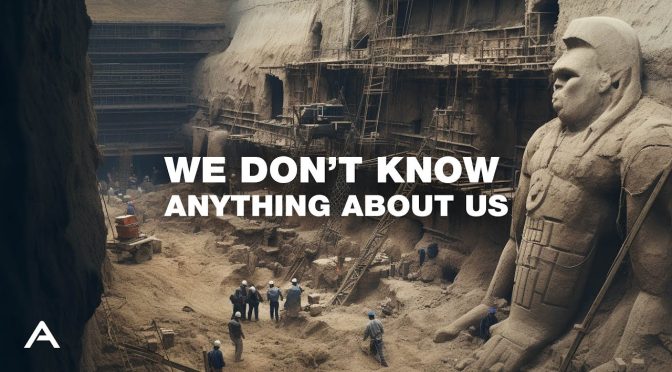Based on the video titled “Why 99% of Humanity Is Lost to Time” by Aperture, this article delves into the vast expanse of human history, much of which remains shrouded in mystery. The video paints a vivid picture of the potential loss of human knowledge and the importance of preserving our past.
Contents
- The Fragility of Civilization
- The Tragedy of Alexandria
- The Unwritten Past
- The Evolution of Early Humans
- Theories and Speculations
- The Planet’s Untold Stories
- The Importance of Preservation
- The Fragility of Historical Knowledge
- The video
The Fragility of Civilization
Imagine a world where every major city is obliterated, every piece of information about our existence wiped out, leaving only a handful of children to carry forth the legacy of humanity. While this scenario might sound like the plot of a dystopian novel, the reality is that significant portions of our history have already been lost. The video suggests that such catastrophic events, minus the nuclear aspect, might have occurred in the past, leaving us with mere fragments of once-great civilizations.
The Tragedy of Alexandria
In 48 BC, the Library of Alexandria, a monumental repository of ancient knowledge, was consumed by flames. This library, situated in present-day Egypt, once housed over half a million documents from various civilizations. Its destruction signifies one of the most significant losses of ancient knowledge. While there are numerous theories about the cause of the fire, the real tragedy lies in the invaluable insights and understandings that went up in smoke.
The Unwritten Past
Beyond the tangible records, a vast portion of human history remains undocumented. Early humans, though lacking in modern tools, exhibited profound understanding in fields like mathematics and engineering. This is evident in architectural marvels like the Great Pyramid. Yet, much of their daily lives, their emotions, dreams, and aspirations, remain unknown to us.
The Evolution of Early Humans
Tracing back to our origins, humans first emerged around 300,000 years ago during the last ice age. The Stone Age marked the beginning of our journey, characterized by the use of tools and a shift from nomadic lifestyles to settled farming communities. As time progressed, humans entered the Bronze Age, introducing metal tools, organized governance, and the dawn of written history. The subsequent Iron Age saw advancements in construction, agriculture, and written documentation.
Theories and Speculations
Throughout history, humans have been intrigued by their ancestors. Theories such as the existence of an “original Eve,” the common ancestor to all humans, have captivated our imagination. Recent discoveries, like princely burials and grand stone temples from the Paleolithic era, challenge our previous assumptions about early human societies. These findings suggest that ancient humans might have had more organized societies, possibly with leaders and dynasties.
The Planet’s Untold Stories
Beyond human history, the Earth itself holds countless secrets. The possibility of a pre-human civilization, though speculative, is a tantalizing thought. Evidence like the thermal maximum event, which occurred 55.5 million years ago, raises questions about the existence of advanced societies before our time.
The Importance of Preservation
The burning of the Library of Alexandria serves as a stark reminder of the fragility of knowledge. Throughout history, knowledge has been targeted, be it through violent acts or mere negligence. In contemporary times, the closure of libraries and the increasing control of tech companies over our archives underscore the urgency of preserving our shared history. The responsibility lies with us to ensure that future generations have access to the rich tapestry of our past.
The Fragility of Historical Knowledge
History, as we understand it, is a tapestry woven from threads of documented events, oral traditions, and archaeological findings. Yet, the vastness of time and the impermanence of records cast shadows of doubt on our comprehension of the past. What if, in the annals of time, there existed a global conflict so devastating that it obliterated every trace of its occurrence?
Consider the possibility that civilizations before us reached pinnacles of advancement, only to be wiped out by cataclysmic events. The remnants of their existence, their stories, and their knowledge might have been erased, leaving us oblivious to their legacies. This perspective challenges our understanding of progress. Are we truly pioneers in our advancements, or are we unknowingly retracing the steps of those who came before us?
The impermanence of records and the decay of physical evidence over millennia make it plausible that significant chapters of history remain undiscovered or misunderstood. This uncertainty underscores the importance of humility in our quest for knowledge. While we pride ourselves on the advancements of the modern age, we must remain open to the idea that we might be only one of many peaks in the undulating landscape of human progress.
Moreover, the idea that entire civilizations could vanish without leaving discernible traces prompts introspection about our own legacy. Will future generations remember us, or will they, too, be left piecing together fragments of a world they barely comprehend?
In embracing this philosophical perspective, we are reminded of the transience of existence and the value of preserving knowledge. It serves as a call to action, urging us to document, preserve, and pass down our stories, ensuring that the lessons, triumphs, and tragedies of our era endure in the collective memory of humanity.

